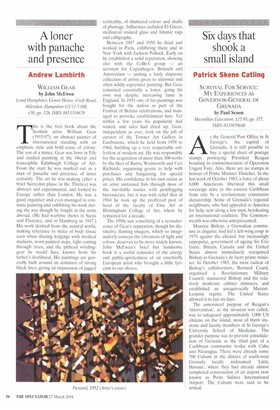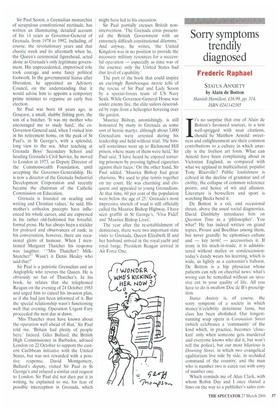Six days that shook a small island
Patrick Skene Catling
SURVIVAL FOR SERVICE: MY EXPERIENCES AS GOVERNOR-GENERAL OF GRENADA by Paul Scoon Macmillan Education, 175.95, pp. 357 ISBN 0333970640 At the General Post Office in St George's, the capital of Grenada, it is still possible to buy a special sheet of postage stamps portraying President Reagan beaming in commemoration of Operation Urgent Fury. Alas, there are no stamps in honour of Prime Minister Thatcher. In the last week of October 1983, a force of about 6,000 Americans liberated this small sovereign state in the eastern Caribbean from rule by a revolutionary communist dictatorship. Some of Grenada's regional neighbours, who had appealed to America for help, sent along a few men, betokening an international coalition. The Commonwealth was otherwise unrepresented.
Maurice Bishop, a Grenadian communist in disguise, had led a left-wing coup in 1979 against the elected, but increasingly unpopular, government of ageing Sir Eric Gairy. Britain, Canada and the United States almost immediately recognised Bishop as Grenada's de facto prime minister. In October 1983, the most radical of Bishop's collaborators, Bernard Coard, organised a Revolutionary Military Council, massacred Bishop and his relatively moderate cabinet ministers, and established an unequivocally MarxistLeninist regime. The United States allowed it to last six days.
The announced purpose of Reagan's 'intervention', as the invasion was called, was to safeguard approximately 1,000 US citizens on the island, most of them students and faculty members of St George's University School of Medicine. The grander purpose was to prevent consolidation of Grenada as the third part of a Caribbean communist troika with Cuba and Nicaragua. There were already some 700 Cubans in the district of south-west Grenada locally nicknamed 'Little Havana', where they had already almost completed construction of an airport now known as Point Salines International Airport. The Cubans were said to be armed. Sir Paul Scoon, a Grenadian monarchist of scrupulous constitutional rectitude, has written an illuminating, detailed account of his 14 years as Governor-General of Grenada. from 1978 to 1992, including, of course, the revolutionary years and that chaotic week and its aftermath when he, the Queen's ceremonial figurehead, acted alone as Grenada's only legitimate government. His unprecedented, improvised role took courage and some fancy political footwork. In the governmental hiatus after liberation, he appointed an Advisory Council, on the understanding that it would advise him to appoint a temporary prime minister to organise an early free election.
Sir Paul was born 68 years ago, in Gouyave, a small, shabby fishing port, the son of a butcher. 'It was my mother who encouraged me to study hard,' the exGovernor-General said, when I visited him in his retirement home, on the peak of St Paul's, in St George's, with a splendid, long view to the sea. After teaching at Grenada Boys' Secondary School and heading Grenada's Civil Service, he moved to London in 1973. as Deputy Director of the Commonwealth Foundation, until accepting the Governor-Generalship. He is now a director of the Grenada Industrial Development Corporation and recently became the chairman of the Catholic Commission on Education.
'Grenada is founded on reading and writing and Christian values,' he said. His mother's orthodox precepts have influenced his whole career, and are expressed in his rather old-fashioned but forceful, formal prose. He has always been a stickler for protocol and observances of rank; in his conversation, however, there are occasional glints of humour. When I mentioned Margaret Thatcher his response was laughter. "Mrs Thatcher? MilkSnatcher!" Wasn't it Denis Healey who said that?'
Sir Paul is a patriotic Grenadian and an Anglophile who reveres the Queen. He is obviously no fan of Thatcher's. In his book, he relates that she telephoned Reagan on the evening of 24 October 1983 and urged him to cancel his invasion plan, as if she had just been informed of it. But the special relationship wasn't functioning well that evening. Operation Urgent Fury proceeded the next day at dawn.
'Mrs Thatcher must have known about the operation well ahead of that,' Sir Paul told me. 'Britain had plenty of people here.' Indeed, Giles Bullard, the British High Commissioner in Barbados, advised London on 22 October to support the eastern Caribbean initiative with the United States, but was not rewarded with a positive response. David Montgomery, Bullard's deputy, visited Sir Paul in St George's and relayed a similar oral request to London. Sir Paul did not dare put it in writing, he explained to me, for fear of possible interception in Grenada, which might have led to his execution.
Sir Paul partially excuses British nonintervention. 'The Grenada crisis presented the British Government with an extremely difficult constitutional dilemma.' And anyway, he writes, 'the United Kingdom was in no position to provide the necessary military resources for a successful operation — especially as time was of the essence; only the United States had that level of capability.'
The part of the book that could inspire an excitingly Ramboesque movie tells of the rescue of Sir Paul and Lady Scoon by a special-forces team of US Navy Seals. While Governor-General House was under enemy fire, the elite sailors descended by rope from a helicopter hovering over the garden.
Maurice Bishop, astonishingly, is still honoured by many in Grenada as some sort of heroic martyr, although about 3,000 Grenadians were arrested during his leadership and held without trial. 'He himself sometimes went up to Richmond Hill prison, where many of them were held,' Sir Paul said. 'I have heard he enjoyed torturing prisoners by pressing lighted cigarettes against their faces.' On the other hand, Sir Paul added, 'Maurice Bishop had great charisma. We used to play tennis together on my court. He was charming and eloquent and appealed to young Grenadians. At that time, 60 per cent of the population were below the age of 25.' Grenada's most impressive stretch of road is still officially called the Maurice Bishop Highway. I have seen graffiti in St George's, 'Viva Fidel' and 'Maurice Bishop Lives'.
The year after the re-establishment of democracy, there were two important state visits to Grenada. Queen Elizabeth II and her husband arrived in the royal yacht and royal barge. President Reagan arrived in Air Force One.



























































































 Previous page
Previous page